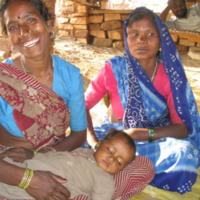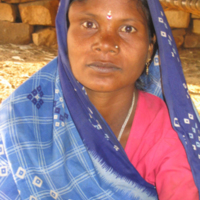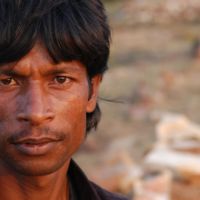
I want to talk about my life as a bonded laborer, as a slave. It was very tough living under the control and exploitation of the slave owners. During those days, my husband was in prison. I tried to go to Bara to file a report. The police refused to file one. I didn’t know what to do. My eyes were red from weeping uncontrollably day in and day out. I went every single day for four days and asked them to file a report, to hear my account of the story. Nobody was there, nobody paid any heed. I then went to Allahabad, sat on a car all the way. It was only then that somebody heard my side of the story. I was asked to come and produce myself as a witness. I did. I cried repeatedly: “What to do, where to go, whom to meet?” Everything was such a mess.
Things began to become a little better, however, when Sankalp came into my life. Because of them, there were regular meetings conducted. But even that was something that slave owners could not tolerate. They refused to let us hold meetings in the village itself. We all started meeting at a place called Ramgarh, a huge open ground.
Sankalp told us: “You’re under the obligation and the exploitation of the slave owners.” They said that life could be better; that if we heard them out, and listened to what they had to say, we would be able to live free from any form of exploitation—have basic freedom to do what we wanted to do. They told us we could all collect together, fight against the exploitation of the slave owners and then live our own life. Later they promised our children education, so that they would not be laborers, but initially the first step was to get us together so we could think of how to get out of clutches of the slave owners.
We were barred entry into our own village. After four whole days we were finally allowed inside and we saw there was nothing left of the houses, there was not one single piece of clothing to wear, no food to eat, no utensils, nothing. We were left to fend for ourselves, without any means of livelihood. Sankalp came in to help us. They would organize food from other villages and give us food to eat. It was during this time that we acquired a lease.
We’re happy now here. We have a lease, we work, we get our money, we earn our own livelihood, we have food to eat. Now I can dream about a future, and live a happy life. I feel a little lazy—it’s so easy. Our kids go to school. For my son my dream is that he does well, he learns, he studies, he reaches high up, and he’s not like me—he doesn’t break stones. That’s my dream. I’m very happy. You all sing, you dance. There’s joy in our life now.
Narrative as told to Peggy Callahan for Free the Slaves, November 2, 2004, in Azad Nagar, Uttar Pradesh, India.


